119 Products
-
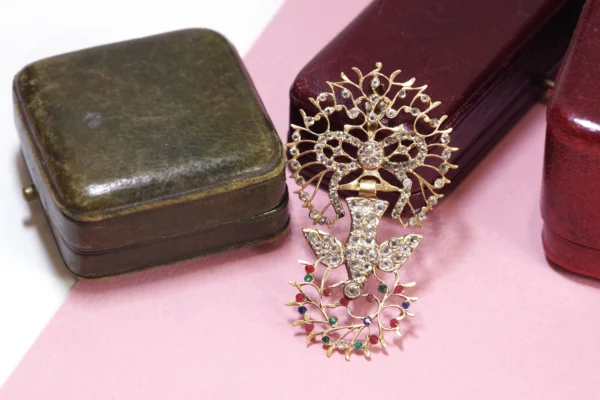
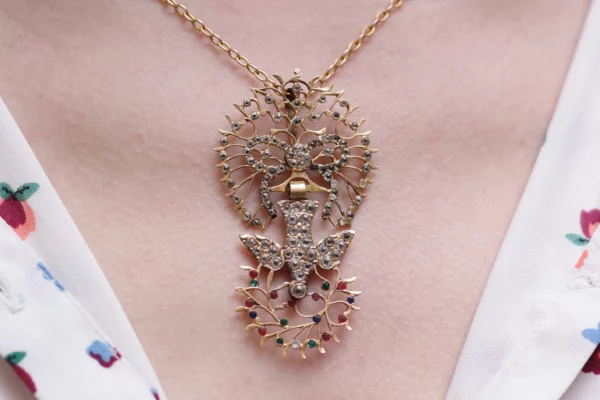 1500,00€
1500,00€Gold Normandy Saint Esprit pendant in 18 karat gold. Originally from Normandy, it features a dove with its head down, holding an olive branch in its beak. The bird hangs from a bow richly decorated with white paste stones, imitating diamonds. Red and green faceted glass adorns the olive branch at the bottom. A flat ring on the reverse of the pendant allows it to be worn on a velvet chain or ribbon. Norman regional catholic pendant, France, circa 1850.
Horse hallmark (1838-1919), regional trumpet hallmark and partially erased goldsmith’s hallmark.
Height: 6.5 cm
Width: 3.7 cmCondition: minor wear
Weight : 8.60 gr
*The antique box and the chain are not sold with the jewel*
See our antique chains -
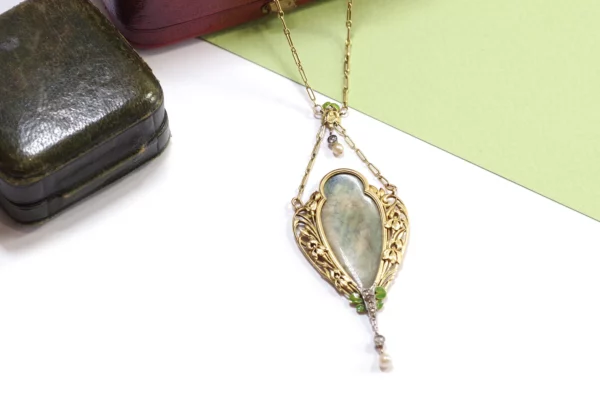
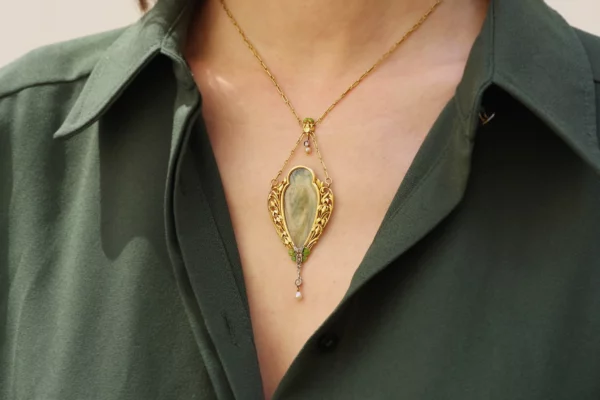 2800,00€
2800,00€French Art Nouveau iris water lilies necklace in 18 karat yellow gold. Lovely Art Nouveau necklace featuring a pendant enclosing a miniature in a frame decorated with irises and water lilies. The miniature depicts a ghostly woman near a satyr-headed fountain. The blue and green colors are partially washed out and faded, giving the whole a mossy agate appearance. The pendant is held by two chains joined by an iris decorated with a rose-cut diamond and a fine pearl. Green varnish highlights decorate the pendant. The lower part is set with rose-cut diamonds and a tassel with diamonds and natural pearls. Art Nouveau pendant, circa 1900, France.
Eagle head and rhinoceros hallmarks (French State hallmark for 18 karat gold)
Total length of necklace: 39.5 cm
Pendant dimensions: 8 x 3.2 cmCondition: partially faded miniature, clasp changed, later green varnish (can be removed with nail polish remover)
Weight : 16.60 gr
*The antique box is not sold with the jewel*
-
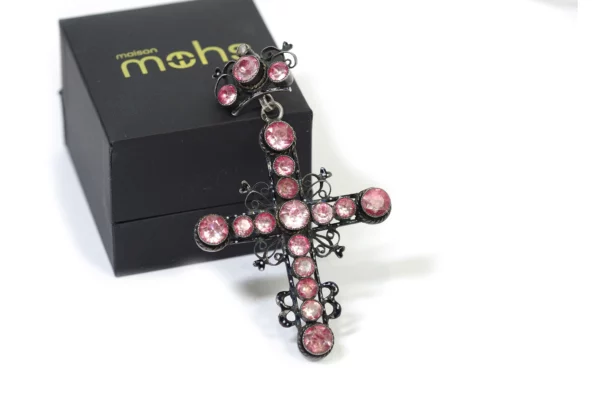
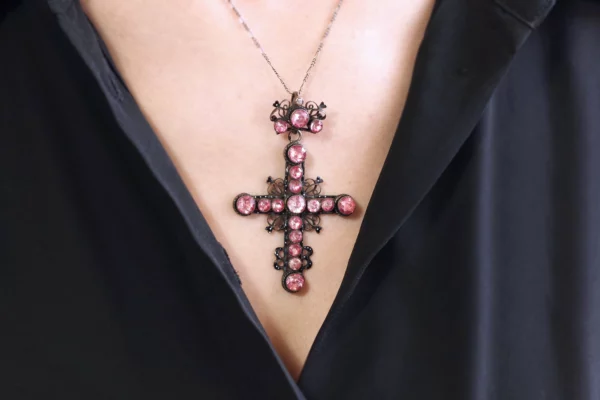 480,00€
480,00€Victorian French enamel foiled paste cross pendant in silver. This cross is in silver with filigree decoration, forming a cross adorn with paste faceted pink glasses on spangles meant to have a look of pink topaz. A black enamel decoration with white dots covers the entire pendant. A glass bead adorns the upper part of the composition. The bezels are completely closed. French work from the beginning of the 19th century
French work from the middle of the 19th century
Wild boar hallmark
Width: 4.3 cmCondition: lack of enamel, cracks.
Weight: 13.37 g
*The antique gold chain is not sold with the jewel*
See our antique chains -
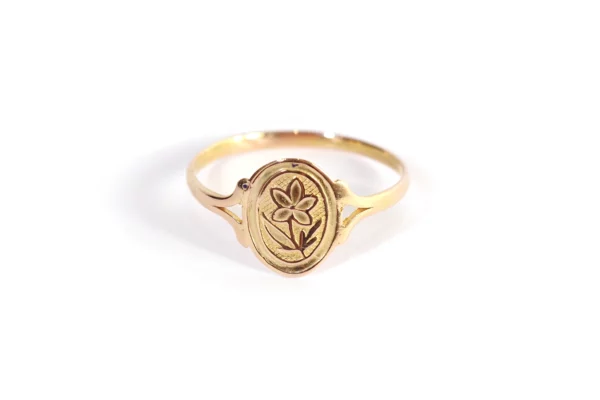
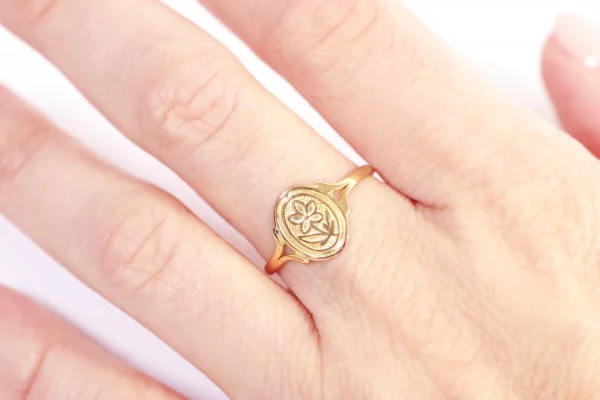 480,00€
480,00€French Victorian pansy ring in 18 karat gold. Antique ring decorated with a pansy in an oval cartouche. Usually, these rings were decorated with multicolored enamels, but these have disappeared. Regional ring, Poitou region, circa 1860, France.
Partially erased horsehead hallmark (french state hallmark for 18 karat gold)
Design size: 10 x 9 mm
Finger circumference: 54.5 UE or 7 US (possible sizing)
Condition: slight wear scratches, enamel decoration missing.
Weight : 1.09 gr
-
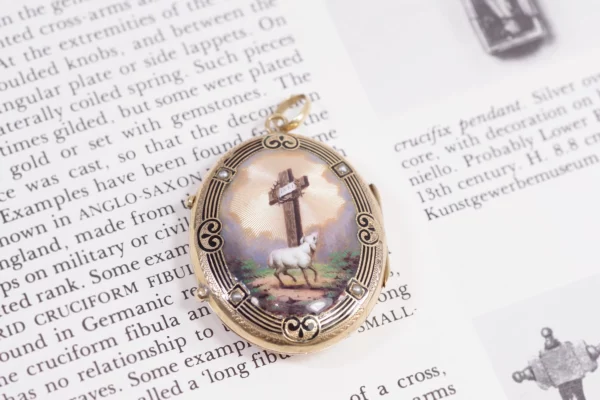
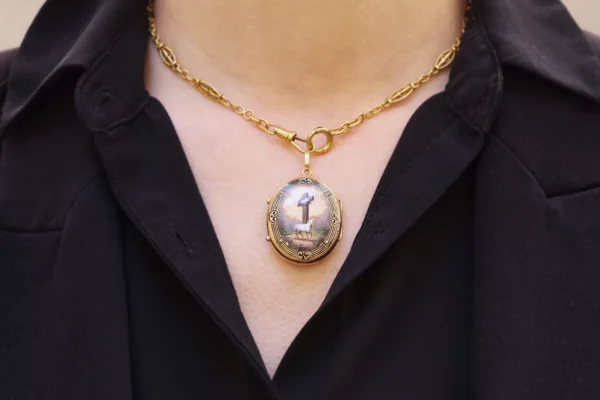 1300,00€
1300,00€Enameled Swiss antique locket in 14 karat gold. Antique opening medallion with enamel decoration on a guilloché background depicting a lamb at the foot of the Cross, bearing the inscription “INRI”, meaning the Latin words Iesus Nazarenus Rex Iudaeorum, i.e. “Jesus the Nazarene King of the Jews”, whom Pilate had placed on the Cross. Jesus, also known as the “Lamb of God who takes away the sins of the world”, is likened to a sacrificial lamb. The contours of the medallion are decorated with fine half-pearls and black enamel. The reverse of the pendant is decorated with chasing and black enamel forming hearts around a rhombus. The locket can be opened to conceal a photograph. It can be worn either way. Antique opening pendant, circa 1880, Switzerland.
Trefoil hallmark for the clasp in 9k, the rest tested 14 karats
Height (including setting): 42 mm
Width: 27 mm
Depth: 9 mmCondition: tiny missing at bottom left, fine scratches
Weight : 6.68 gr
*The antique gold chain is not sold with the jewel*
See our antique chains -
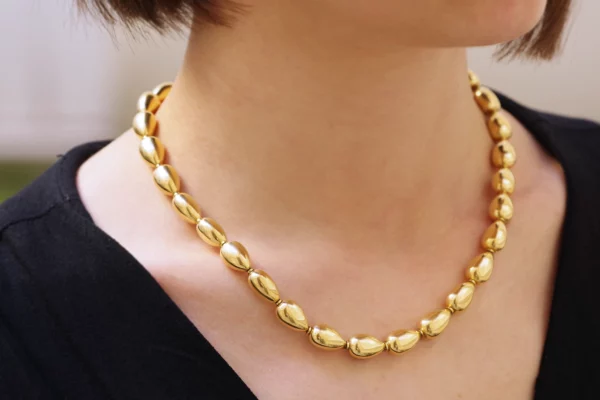
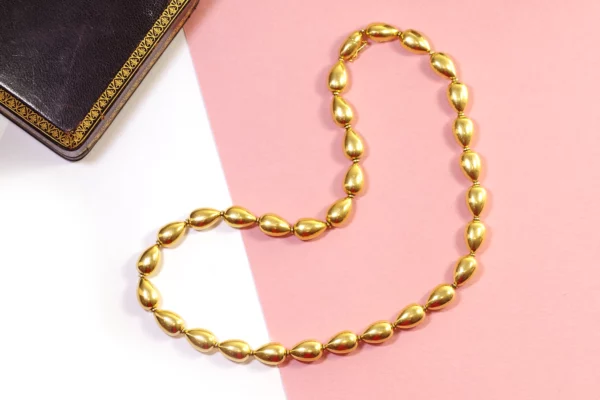 4300,00€
4300,00€Gold beads necklace in 18 karat yellow gold (750) consisting of gold seed beads strung on a gold chain. The necklace closes with a clasp hidden in a seed. Very nice patina. Vintage necklace from the 1980s, France.
Eagle head hallmark (french state hallmark for 18 karat gold), 750 hallmark and NBA goldsmith’s mark.
Length: 46.5 cm
Size of a pearl: 14 x 9 mmCondition: scratches from use
Weight : 48.76 gr
*The antique box is not sold with the jewel*
-
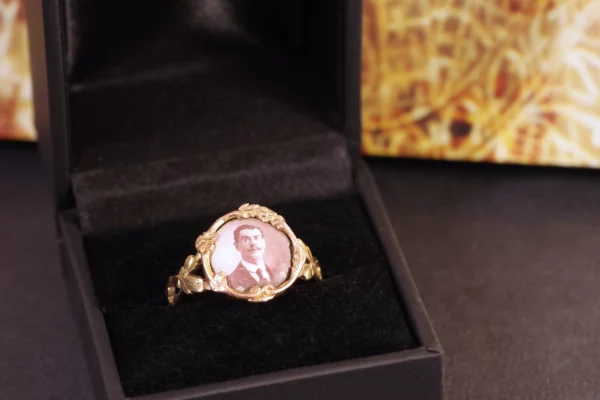
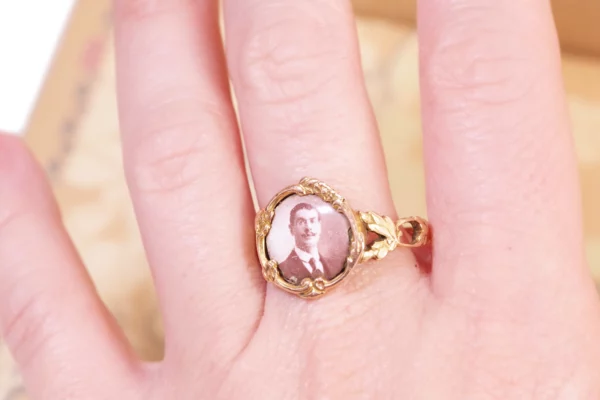 880,00€
880,00€Victorian photo portrait enamel ring in 18 karat gold (750). Victorian sentimental ring with a photograph on enamel depicting a portrait of a man. The photograph is sepia-toned, and the man is dressed in late 19th-century fashion. The ring is set in gold, highly decorated with foliage. Sentimental ring, circa 1860-1870, France.
Eagle head hallmark
Size: 61 UE or 9.5 Us (can be changed)
Bezel size: 2 x 2 mm
Condition: scratches to the enamel, small lack at the bottom.
Weight: 3.08 g
More info: In 1854, Lafon de Camarsac invented photographic enamels, and was one of the first to fix photographic images on metal and ceramic materials. Working with Eugène Disdéri, he joined forces with photographers François Martial Pinel Peschardière (1858-1862) and Étienne-Prosper Berne-Bellecour (1864-1865).
*The antique box is not sold with the jewel*
-
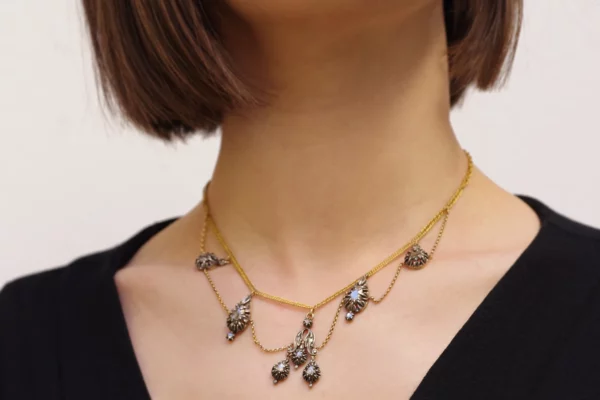
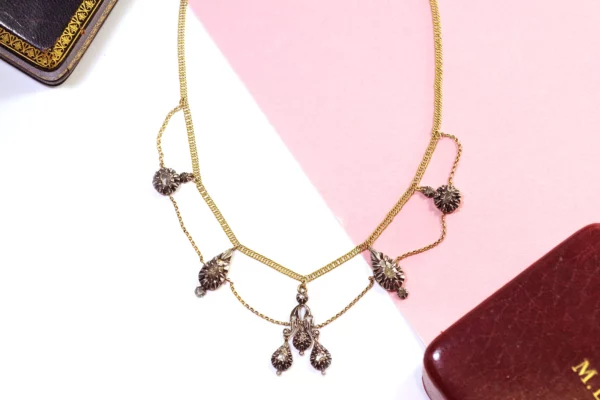 3000,00€
3000,00€French regional diamond drapery necklace in 18 karat (750) yellow gold and silver. Antique regional necklace made up of five silver elements set with rose-cut diamonds. The central pendant holds two dangling diamonds. Round cable mesh chains link each diamond-set element. The main chain is antique yellow gold. Antique Arles drapery necklace, Provence, late 19th century, France.
Boar and eagle head hallmark on the chain, horse head hallmark on the chain (french state hallmarks for 18 karat gold and silver)
Total length: 39 cm
Dimensions of central element: 35 x 25 mmCondition: the clasp is not centred on the chain
Weight : 17.09 gr
*The antique boxes are not sold with the jewel*
-
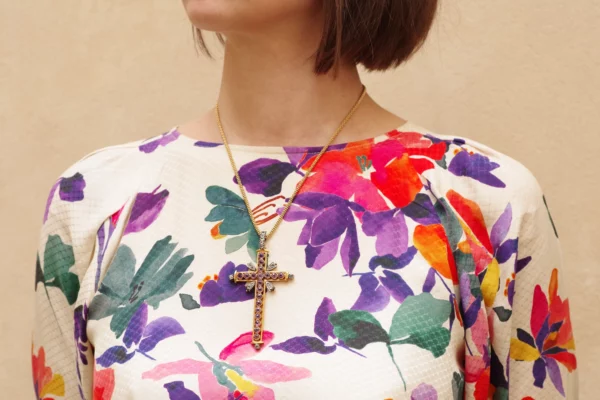
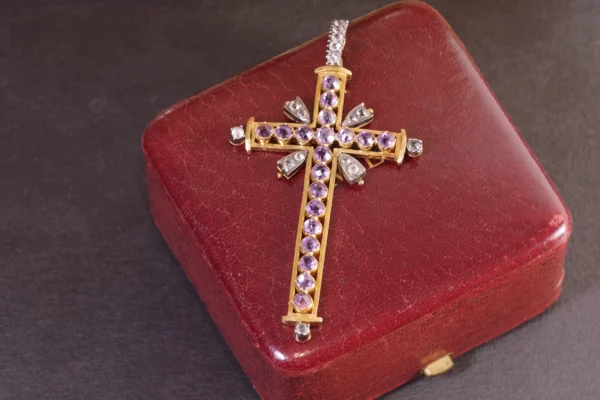 3900,00€
3900,00€Large amethyst cross pendant in 18 karat (750) yellow gold and silver. Large religious cross to be worn as a pendant, set with 19 round facetted amethysts and paste white stones. Religious ceremonial jewellery, late 19th century, southern France or Italy.
Owl and swan hallmarks (French State hallmarks for 18 karat gold and silver).
Dimensions: 90 x 50 mm
Condition: scratches from use, small dents.
Weight: 28.86 gr
*The antique box and the chain are not sold with the jewel*
See our antique chains -
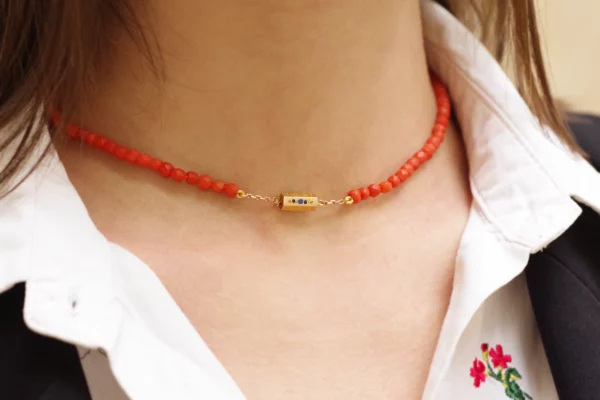
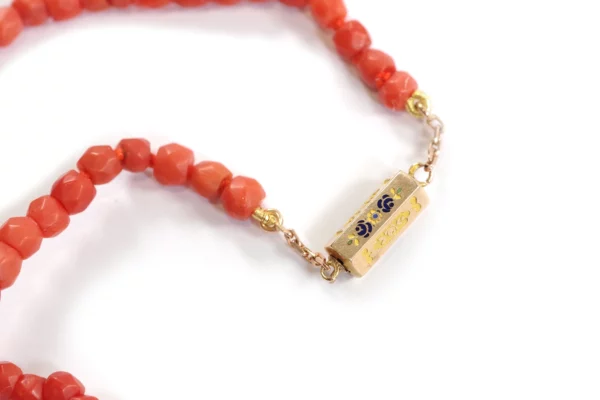 820,00€
820,00€Coral necklace with French antique clasp in 18 karat (750) rose gold. Choker necklace composed of 92 faceted coral beads. The necklace closes with a barrel clasp with six enameled facets in a floral design. Antique necklace, late 19th century, France.
Eagle head hallmark (French state hallmark for 18 karat gold).
Total length: 37.5 cm
Clasp dimensions: 5 x 11 mmNote: the necklace has been threaded.
Condition: scratches from useWeight : 9.75 gr
-
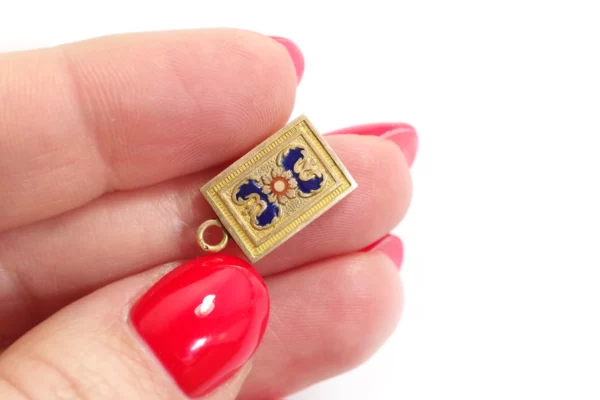
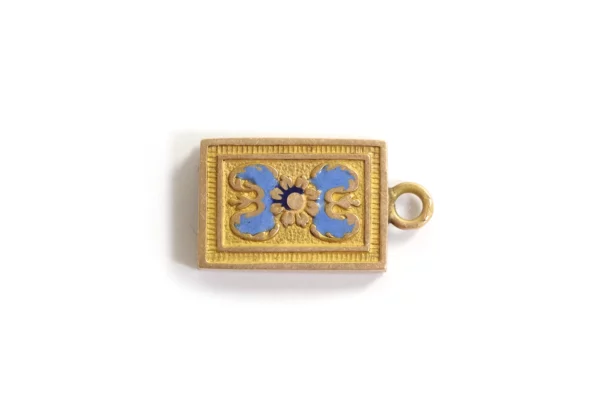 210,00€
210,00€Small enameled clasp pendant in 18 karat (750) gold. This Normandy clasp, in hollow gold. It is decorated with colored enamel: on one side, a red enameled flower framed by midnight-blue leaves, within a cartouche. The cartouche is surrounded by a jagged frieze; on the other side, the same motif […]
-
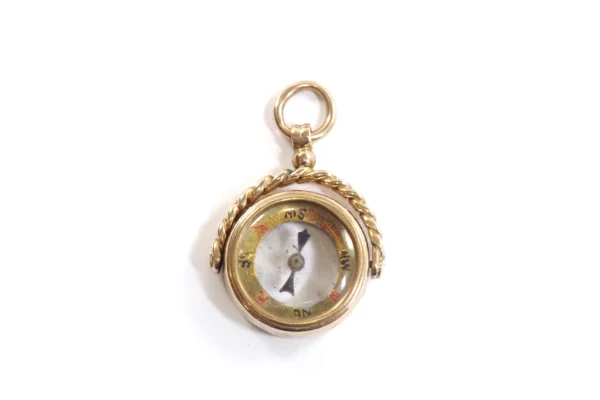
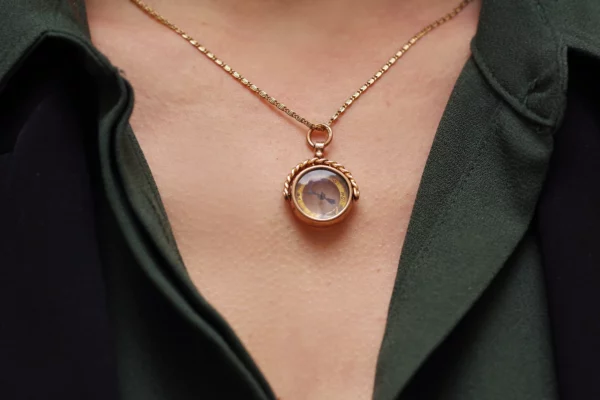 750,00€
750,00€Victorian compass pendant in 9 karat gold (375). A very original compass-shaped pendant that can be rotated on itself, allowing it to be placed on the table to find North. Inside, an arrow rotates on the cardinal points. The compass is two-sided, with both sides protected by glass. It is decorated with a gold cord that holds the hoop. The North indication works. Made in England, Birmingham, 1891.
Clover hallmark, Marks: Marine anchor (Birmingham), R for 1891, MW.
Dimensions: 32 x 20 mm
Diameter: 20 mmCondition: dust inside the compass, slight dents, wear light scratches on gold and glass.
Weight: 5.26 gr
*The antique box is not sold with the jewel*
Learn more: How does a compass work? A moving needle inside the compass reacts to a magnet, the Earth. Indeed, as our planet contains a lot of iron, it is magnetic, and the small moving needle inside the compass uses this to indicate the north-south direction. However, this only works if there are no other magnets near the compass. Note that the needle of a magnetic steel compass always points approximately north.
